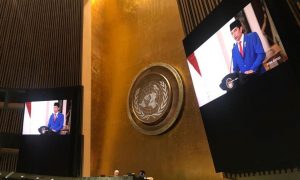Southeast Asia is especially exposed to the deluge of consequences that climate change brings. The region is already experiencing unnatural weather patterns, as devastating floods in Malaysia and the Philippines show. Yet, perhaps insufficiently recognised and analysed is how, beyond environmental and economic wreckage, climate change will create upheavals in the geopolitical order, producing new winners and losers. This emerging geopolitical constellation will throw up important questions for policymakers.
Within Southeast Asia, the country that needs to consider the issue most deeply is fossil-fuel rich Indonesia. As scholars on the topic note, currently those that stand to lose are those who continue to bet on fossil-fuels and are slow to transition their economies, especially those who are fossil-fuel rich and dependent on resource mining. Despite some indications of progress, Indonesia’s most recent climate action flatters to deceive.
The recently announced carbon tax of USD$2 per ton of CO2 over a set limit is around 40 times less than the amount recommended by established institutions like the IMF. Indonesia’s performance at COP26 was also underwhelming, with its support for the Global Coal to Clean Power Transition Statement conspicuously watered-down. Not only did it decline to support the clause to stop issuance of new permits for coal generation projects, it stopped short of committing to tackling coal, noting that it would merely “consider” going along with the coal phase out, with the additional condition of receiving international aid—a subject its leaders surely know is a major sticking point and is unlikely to be resolved anytime soon. Indonesia then walked back its pledge to end deforestation by 2030, much to the chagrin of both international and domestic actors.
Indonesia’s long-term position in the global political economy will hinge on whether it decides to stubbornly hold on to fraying systems and merely make half-hearted attempts to address climate change, or if it boldly embarks on extensive reforms to its presently fossil fuel-dependent economy. In particular, much depends on whether it can rapidly phase out coal and take serious advantage of its potential in renewable energies, positioning itself as a provider of a resource with growing—instead of declining—strategic significance.
Exporting renewable energy, securing geo-economic strength
Thus far, the vast potential of renewables in Indonesia has been critically underutilised. If fully tapped, its renewable energy sources could generate more than six times its energy needs as measured in 2020 . This wastes a reservoir of potential geopolitical power; developing and exporting renewable energy will allow Indonesia maximum geopolitical gains. This entails eventually developing renewable energy beyond levels of domestic necessity, and channelling excess amounts for export to neighbouring countries that do not have the same capabilities for clean energy production. Developing excess energy is challenging but perhaps necessary to stave off discontent arising from economic nationalism—a long-standing sentiment in Indonesia rooted in its colonial experience. The geopolitical benefits of this would mostly come in the medium-term, but in the meantime, a lower target of credibly signalling intent would allow give neighbouring states a stake in Indonesia’s renewable energy development. This in turn should pave the way for friendlier relations, increased investments, and in some cases the transfer of expertise.
Significantly, with ramped up renewable energy capabilities, Indonesia would hold the key to development of an ASEAN or Australian-Asian Power Grid. Energy sharing arrangements like these are significant not only for its increased gains in energy efficiency, but also build greater energy security for the region as a whole. Indonesia also plays a key role in the development of this grid because of its geographic position near Australia. Any link between Australia and Southeast Asia, for example recent arrangements by the private company Sun Cable to transport large amounts of solar energy from Australia’s Northern Territory to Singapore, will likely have to run through Indonesia. Indonesia therefore plays the de facto role as coordinator of energy relations with Australia, the latter of which has lofty aspirations to be a clean energy superpower, exporting green hydrogen and key materials necessary for green technologies.
Further geopolitical significance is exhibited if we understand these dynamics in the context of a rising China. Instead of looking towards Australia, a possible other alternative for ASEAN is to lean on hydropower arrangements from its North, looking at the links between China and Indochinese states like Laos and Myanmar. China, moreover, presently holds the lead in the development of key technologies like solar panels.
If groupings like the QUAD intend to check the rise of Chinese influence in ASEAN, one way of doing so is to establish clean energy supply chains to break Chinese monopoly. If the QUAD wants to include ASEAN in this supply chain, Indonesia will be the obvious contact point, not only because of its geographical location, but also because of the presence of critical minerals like nickel. Firmly establishing itself as a key node in global supply chains allows Indonesia to be in a stronger position to produce and install clean energy technologies domestically—an area in which it currently lags behind contemporaries like Vietnam. The geopolitical implication would be to ensure that the focal point of Southeast Asian renewable energy supplies is not only the Mekong Delta, but also the Indian Ocean.
Coal not viable in long-term
The flipside of cultivating renewable energy is reducing dependence on fossil fuels. Coal plays a dual role in Indonesia’s economy—it is domestically consumed, accounting for over 60 percent of its energy, and as of December 2021, Indonesia is currently the world’s biggest exporter of coal. Coal remains both a key source of revenue as well as a source of geopolitical relevance; major powers like China and India have much greater reason to develop friendly relations with Indonesia to ensure access to this strategic resource.
Recent trends might give ammunition to sceptics who advocate for a more conservative approach, retaining the large subsidies that underpin coal’s place in Indonesian life. Global demand for coal has picked up in the global pandemic recovery phase, and has in fact soared after global price shocks to natural gas. Furthermore, Chinese demand for Indonesian coal has greatly increased after the souring of Sino-Australian relations disrupted its energy trade. This might seem to vindicate those who think that a coal phase-out is premature.
The next decade or so will certainly see periodic episodes where fossil fuels will be sought, and producers will certainly benefit during these phases. As Bordoff and O’Sullivan noted in Foreign Affairs magazine, the green transition will not be a smooth process but instead one of heavy experimentation. Yet, observers should resist seduction and not mistake the short-termism of this trend for a strategy with long-term viability. Ultimately, further investment in coal will only increase the amount of stranded assets. An academic study in the journal Nature calculated that Indonesia stands to lose USD$293 billion if it continues on its current path. External demand for Indonesian coal will likely taper off, and the geopolitical relevance of the resource will accordingly recede.
It is also important to clarify misunderstandings about China’s trajectory, especially given it remains the largest consumer of fossil fuels. As Hsu pointed out in the New York Times, the Chinese turn to coal after the recent natural gas price shock is, contrary to some analyses, not a signal of their long-term direction. In fact, the Chinese reaction has been to double down on their resolve take environmental leadership, and transition quickly to renewable energy in order to ensure energy security. The more important episode that accurately signals Chinese intentions is perhaps the announcement to end funding for new coal plants.
Upsurge in demand for Indonesian coal, then, is a temporary and fleeting event, not a long-term strategy. This suggests that recent attempts to transition away from coal, like the energy ministry’s Regulation No.26/2021 (RUPTL) should be ramped up, not abandoned.
Trends in climate politics scholarship
Merely putting forward policy suggestions for Indonesia or the benefits that they will bring is potentially impotent exercise if one does not bring in a complementary analysis on how to work towards a political situation where these pursuits can be achieved. On this point, recent scholarship on the drivers of climate action could be instructive.
Nationalist rhetoric is impeding climate action in Indonesia
Indonesia's environmental policies are at odds with the rhetoric around palm oil production and Indonesians are not equipped with enough information to understand the risks of a changing climate.
Past arguments have suggested that the reticence of countries like Indonesia to take strong climate action is due to a collective action problem, where countries will only pursue climate action when it is assured that others would do so robustly as well. Forging out on its own would mean being a “sucker”, sacrificing while others benefit. This ostensibly explains the status quo of slow climate action on a global level, and suggests that the solution lies in having greater global dialogue on the issue through international fora like COP. In these fora, states can attain mutual assurance of climate action and feel more secure that they are not pursuing action alone. This global dimension might also explain Indonesia’s reticence in accelerating its green transition as a response to the failure of developed nations to uphold their end of the bargain and providing the adequate climate finance for developing countries like Indonesia—a call that President Jokowi has repeatedly made.
These arguments, while insightful in many ways, are in the process of being overturned. Scholars Aklin and Mildenberger, for example, have argued convincingly that collective action problem models are inadequate, and that the strength of a country’s climate action is ultimately determined by distributive conflict, or the balance of domestic coalitions. As the saying goes, foreign policy begins at home. This argument confounds the notion of an objective “national interest” implicitly built into prior arguments, where a right course of action or interest can be ascertained without reference to the power differentials within a given society. Their arguments have been echoed by other key scholars working in this field, and this line of inquiry is maybe presently the most dynamic within climate politics scholarship.

Activists call for jobs and just transition to renewable energy in Indonesia. By 350.org on Flickr (CC BY-NC-SA 2.0)
If their research is to be taken seriously, it dictates that to move the needle on climate action, greater support should be given to local groups actively calling for greater decarbonisation, including burgeoning grassroots and youth movements. Climate activism has often been dismissed as a nuisance or even counterproductive, but this is not borne out by rigorous research. A January 2021 study found that familiarity with key climate activists like Greta Thunberg increased the likelihood that others would be willing to take collective action on climate change. Empowering the numerous grassroots and youth movements that have popped up in Indonesia over the past few years would recalibrate calculations over the distribution of gains of stronger climate policy. Furthermore, equipping activism with a geopolitical angle might prove useful—grassroots activists could be seen to not just be fighting for the environment, but also to ensure the nation’s geopolitical future is on steady ground. This allows activists to find unlikely partners and build coalitions with those within the foreign policy or security establishment.
Recent accounts suggesting that Indonesia is surging ahead with the development of renewable energy against and despite the interests of its powerful coal lobby are at best premature, and at worst misleading. Indonesia’s coal industry is politically highly influential and its interests deeply embedded in connected industries. It would be imprudent to discount its ability to wield its influence to disrupt any progress or read recent policies as admissions of its defeat. Much more has to be done on the climate front in Indonesia, not only to stem environmental damage, but also the relatively more Machiavellian reason of securing a strong position in the emerging geopolitical order.
 Facebook
Facebook  Twitter
Twitter  Soundcloud
Soundcloud  Youtube
Youtube  Rss
Rss 



